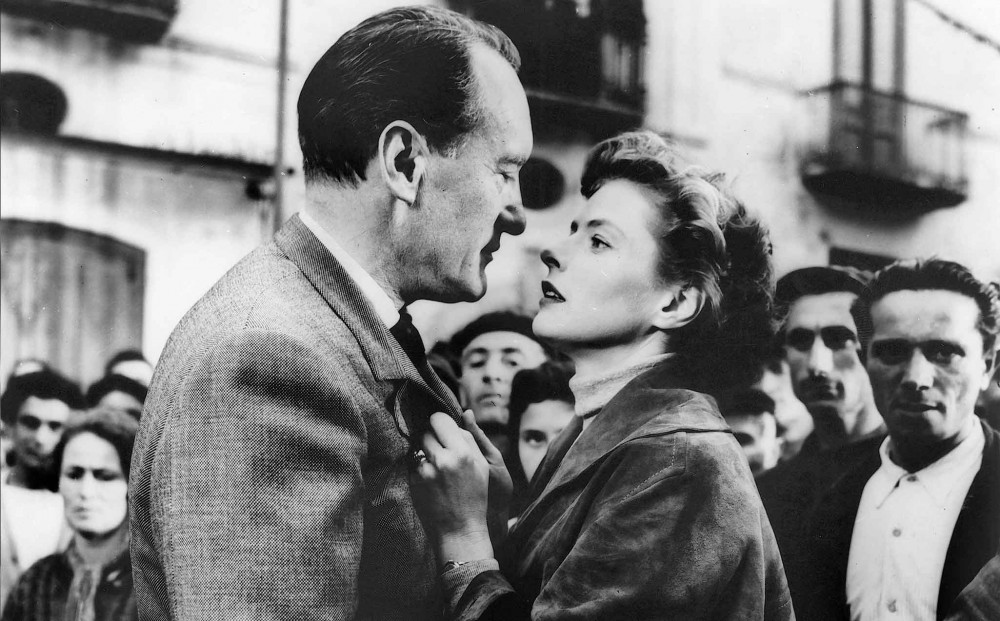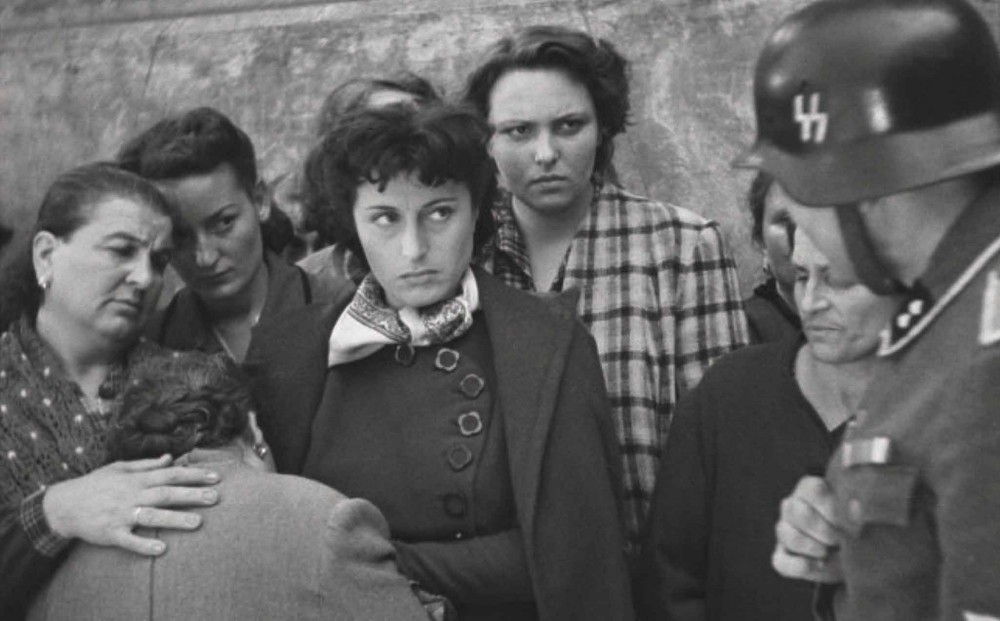OPEN CITY & VOYAGE TO ITALY
Wednesday, August 30
OPEN CITY
12:30 4:25 8:15
VOYAGE TO ITALY
2:40 6:30 10:20
OPEN CITY
Directed by Roberto Rossellini
Starring Anna Magnani
(1945) Rome, winter 1943: as screeching-tired Gestapo dragnets blanket the “open city,” Resistance leader Marcello Pagliero escapes from his apartment by running across the rooftops (as did co-screenwriter Sergio Amidei in real life), as pregnant widow Anna Magnani prepares for her wedding, parish priest Aldo Fabrizi uses the “frying pan method” to hide the local boys’ bomb brigade’s hardware, and effete Major Harry Feist riffles through his collection of incriminating ID photos – but betrayal, a broad-daylight machine-gunning, a Partisan ambush, blowtorch torture, and death by firing squad loom… Based on actual people and all-too-recent incidents (Magnani’s electrifying final scene was inspired by her enraged pursuit of her boyfriends’ escape by truck); written in a week in Federico Fellini’s kitchen (the only place with heat); shot on a number of the real locations, and cast mainly with non-pros (Fabrizi and second-choice Magnani were already famous, albeit for comedy), Open City’s documentary look and still hair-raising violence rocked audiences and critics around the world, making Neo-Realism, Rossellini, and Magnani world-famous, sharing the top prize at Cannes, and running twenty-one consecutive months at a single New York cinema. DCP. Approx. 103 min.
12:30, 4:25, 8:15
“A STILL-THRILLING CALL TO CONSCIENCE AND HOPE! Shot with electrifying urgency months after Rome’s liberation… a cinematic landmark [that brought] Italian neorealism to world-wide attention. Born of wartime trauma and a desire for unity in the new Italy that would come, Rome Open City has lost little of its power.”
- Kristin M. Jones, Wall Street Journal
“THE MOST PRECIOUS MOMENT OF FILM HISTORY!”
– Martin Scorsese
“ROSSELLINI’S NEOREALIST MASTERPIECE... Aldo Fabrizi is compelling as a sympathetic priest, as is Marcello Pagliero as a cool Communist. But towering over all is Anna Magnani, as a pregnant widow, mother and bride-to-be... Plain-spoken, tender and yet indomitable, she provides the film’s central anima.”
- Andy Webster, The New York Times
“Rossellini’s tense, bloody, death-haunted film conjures an authenticity that’s based less on its quasi-documentary style than on a vision that brings ideas to life. It offers a template for a postwar renewal of Italy, as well as Italian cinema.”
- Richard Brody, New Yorker
“A LEGENDARY CINEMATIC ACHIEVEMENT! Its justly celebrated documentary aesthetic and naturalistic performances, aided by the filmmakers' budgetary restrictions and the ruinous state of the postwar Italian film industry, help the work achieve moments of devastating, near miraculous beauty.”
- Oleg Ivanov, Slant
“The fame of Rossellini’s brutal, melodramatic account of the underground resistance to the Nazi occupation rest on its extraordinary immediacy and its rough, documentary look; at its most startling, it seems ‘caught’ rather than staged. Many Americans, used to slick war films, reacted to it as if it actually were caught… The movie gave us a cross-section of a city under terrible stress.”
– Pauline Kael
“Rossellini’s Neo-Realism masterpiece… It scarcely matters how many times you watch it… The story plays like a gripping thriller: a cat-and-mouse game between Gestapo and resistance cell.”
– Cath Clarke, The Guardian
“Still a picture of unrivaled immediacy and passion… memorably preserved a place and a time – and taught generations of filmmakers how to preserve theirs.”
– Michael Wilmington
“ALL ROADS LEAD TO ROME OPEN CITY.”
– Godard
VOYAGE TO ITALY
Directed by Roberto Rossellini
Starring Ingrid Bergman & George Sanders
(1954) In Naples to sell Uncle Bob’s villa, London business man George Sanders and wife Ingrid Bergman find that, after eight years of marriage, they have little to say to each other. And as the closing drags on, Bergman remembers a died-too-young poet who loved her, Sanders frets about time away from work, and they split apart – she to stare at the rawness of the statuary in the Museum, the ionization of Vesuvian craters, the skeletons at the cemetery; he to dally with friends on Capri, languidly pursue an estranged wife, and to wave off an attractive prostitute; both to finally view the plaster molds of the dead of Pompeii. Little happens, and yet subtly we see the degeneration of a marriage. Will it take a miracle to save it? Unsuccessful on first release, but over the years steadily climbing the ranks of All-Time Ten Best lists. DCP. Approx. 85 min.
2:40, 6:30, 10:20
“Rossellini’s method, bringing high-powered actors together in a situation that is essentially documentary, is quietly and deeply radical. It is in effect, the film that inspired the French New Wave.”
– Richard Brody, The New Yorker
“Rarely has screen chemistry worked so indefinably well; Sanders’ suave, caddish businessman superbly complements Bergman’s Garbo-like presence and the sensuous locations in which they feel so ill at ease… its genuinely romantic tenderness mark it as never so unfashionable, never so moving.”
– Don Macpherson, Time Out (London)
“In the final, unforgettable sequence, as the now-reunited, but still-quarreling couple watch a passing religious procession, they are seized with an unexpected emotion… It is one of the most unexpected and transcendent moments in not just all of Rossellini, but in all of cinema.”
– Wheeler Winston Dixon, Senses of Cinema
“Instead of going from one dramatic peak to another, Rossellini forces us to let the small details and events accumulate… It’s hard to convey the emotional pull at the end of this picture, because in order to experience it, you really have to see the whole movie and absorb it.”
– Martin Scorsese
Listen
ROME OPEN CITY: Introduction by Isabella Rossellini
Recorded September 17, 2014 ROME OPEN CITY
ROME OPEN CITY: Q&A with Isabella Rossellini
Recorded September 17, 2014 ROME OPEN CITY


